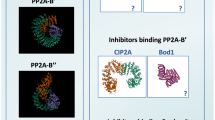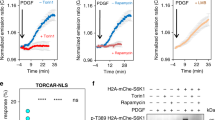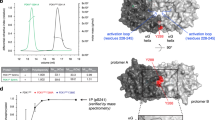Abstract
MAP kinases phosphatases (MKPs) belong to the dual-specificity phosphatase family (DUSP) and dephosphorylate phosphothreonine and phosphotyrosine within MAP kinases. We had previously shown that DUSP6/MKP-3 was phosphorylated and degraded upon growth factor stimulation, in a MEK-dependent manner. Here we show that another pathway involved in growth factor signaling, the PI3K/mTOR signaling pathway, accounts for a part of the phosphorylation and degradation of DUSP6 induced by serum growth factors, as evidenced by experiments using pharmacological inhibitors of PI3 kinase and mammalian target of rapamycin (mTOR). Moreover, specific agonists of the mTOR pathway, such as amino acids or insulin/IGF-1, which do not activate extracellular signal regulated kinases (ERKs) in our cellular model, were also able to induce the phosphorylation and degradation of DUSP6. However, a basal activity of MEK was required for the mTOR pathway-mediated phosphorylation to occur. Mutagenesis studies identified serine 159 within DUSP6 as the target of the mTOR pathway. The ERK phosphatase DUSP6 may thus constitute a novel branch-point of the crosstalk between two major signaling pathways induced by growth factors, the MEK/ERK pathway and the PI3K/mTOR pathway.
This is a preview of subscription content, access via your institution
Access options
Subscribe to this journal
Receive 50 print issues and online access
$259.00 per year
only $5.18 per issue
Buy this article
- Purchase on Springer Link
- Instant access to full article PDF
Prices may be subject to local taxes which are calculated during checkout





Similar content being viewed by others
References
Averous J, Proud CG . (2006). When translation meets transformation: the mTOR story. Oncogene 25: 6423–6435.
Avruch J, Hara K, Lin Y, Liu M, Long X, Ortiz-Vega S et al. (2006). Insulin and amino-acid regulation of mTOR signaling and kinase activity through the Rheb GTPase. Oncogene 25: 6361–6372.
Camps M, Nichols A, Gillieron C, Antonsson B, Muda M, Chabert C et al. (1998). Catalytic activation of the phosphatase MKP-3 by ERK2 mitogen-activated protein kinase. Science 280: 1262–1265.
Chambard JC, Lefloch R, Pouysségur J, Lenormand P . (2007). ERK implication in cell cycle regulation. Biochim Biophys Acta 1773: 1299–1310.
Echevarria D, Martinez S, Marques S, Lucas-Teixeira V, Belo JA . (2005). Mkp3 is a negative feedback modulator of Fgf8 signaling in the mammalian isthmic organizer. Dev Biol 277: 114–128.
Harrington LS, Findlay GM, Gray A, Tolkacheva T, Wigfield S, Rebholz H et al. (2004). The TSC1-2 tumor suppressor controls insulin-PI3K signaling via regulation of IRS proteins. J Cell Biol 166: 213–223.
Jeffrey KL, Camps M, Rommel C, Mackay CR . (2007). Targeting dual-specificity phosphatases: manipulating MAP kinase signalling and immune responses. Nat Rev Drug Discov 6: 391–403.
Kawakami Y, Rodriguez-Leon J, Koth CM, Buscher D, Itoh T, Raya A et al. (2003). MKP3 mediates the cellular response to FGF8 signalling in the vertebrate limb. Nat Cell Biol 5: 513–519.
Kim M, Cha GH, Kim S, Lee JH, Park J, Koh H et al. (2004). MKP-3 has essential roles as a negative regulator of the Ras/mitogen-activated protein kinase pathway during Drosophila development. Mol Cell Biol 24: 573–583.
Land SC, Tee AR . (2007). Hypoxia-inducible factor 1alpha is regulated by the mammalian target of rapamycin (mTOR) via an mTOR signaling motif. J Biol Chem 282: 20534–20543.
Lenormand P, McMahon M, Pouysségur J . (1996). Oncogenic Raf-1 activates p70 S6 kinase via a mitogen-activated protein kinase-independent pathway. J Biol Chem 271: 15762–15768.
Li C, Scott DA, Hatch E, Tian X, Mansour SL . (2007). Dusp6 (Mkp3) is a negative feedback regulator of FGF-stimulated ERK signaling during mouse development. Development 134: 167–176.
Ma L, Chen Z, Erdjument-Bromage H, Tempst P, Pandolfi PP . (2005). Phosphorylation and functional inactivation of TSC2 by Erk implications for tuberous sclerosis and cancer pathogenesis. Cell 121: 179–193.
Mamane Y, Petroulakis E, LeBacquer O, Sonenberg N . (2006). mTOR, translation initiation and cancer. Oncogene 25: 6416–6422.
Marchetti S, Gimond C, Chambard JC, Touboul T, Roux D, Pouysségur J et al. (2005). Extracellular signal-regulated kinases phosphorylate mitogen-activated protein kinase phosphatase 3/DUSP6 at serines 159 and 197, two sites critical for its proteasomal degradation. Mol Cell Biol 25: 854–864.
Marchetti S, Gimond C, Roux D, Gothié E, Pouysségur J, Pagès G . (2004). Inducible expression of a MAP kinase phosphatase-3-GFP chimera specifically blunts fibroblast growth and ras-dependent tumor formation in nude mice. J Cell Physiol 199: 441–450.
McKay MM, Morrison DK . (2007). Integrating signals from RTKs to ERK/MAPK. Oncogene 26: 3113–3121.
Murphy LO, Blenis J . (2006). MAPK signal specificity: the right place at the right time. Trends Biochem Sci 31: 268–275.
Owens DM, Keyse SM . (2007). Differential regulation of MAP kinase signalling by dual-specificity protein phosphatases. Oncogene 26: 3203–3213.
Pouysségur J, Lenormand P . (2003). Fidelity and spatio-temporal control in MAP kinase (ERKs) signalling. Eur J Biochem 270: 3291–3299.
Schalm SS, Blenis J . (2002). Identification of a conserved motif required for mTOR signaling. Curr Biol 12: 632–639.
Smith TG, Karlsson M, Lunn JS, Eblaghie MC, Keenan ID, Farrell ER et al. (2006). Negative feedback predominates over cross-regulation to control ERK MAPK activity in response to FGF signalling in embryos. FEBS Lett 580: 4242–4245.
Acknowledgements
This work was supported by a grant from the French Association for Research on Cancer (ARC) and by a fellowship from the American Institute for Cancer Research to OB and GP. GP was also sponsored by the Ligue Nationale contre le Cancer (‘Equipe labellisée’). We are grateful to Dr Jean-Claude Chambard and Philippe Lenormand for helpful discussions about the manuscript.
Author information
Authors and Affiliations
Corresponding author
Rights and permissions
About this article
Cite this article
Bermudez, O., Marchetti, S., Pagès, G. et al. Post-translational regulation of the ERK phosphatase DUSP6/MKP3 by the mTOR pathway. Oncogene 27, 3685–3691 (2008). https://doi.org/10.1038/sj.onc.1211040
Received:
Revised:
Accepted:
Published:
Issue Date:
DOI: https://doi.org/10.1038/sj.onc.1211040
Keywords
This article is cited by
-
Toxicology knowledge graph for structural birth defects
Communications Medicine (2023)
-
Inflammatory bone marrow signaling in pediatric acute myeloid leukemia distinguishes patients with poor outcomes
Nature Communications (2022)
-
PKN2 in colon cancer cells inhibits M2 phenotype polarization of tumor-associated macrophages via regulating DUSP6-Erk1/2 pathway
Molecular Cancer (2018)
-
microRNA-200a-3p increases 5-fluorouracil resistance by regulating dual specificity phosphatase 6 expression
Experimental & Molecular Medicine (2017)
-
Targeted nanoconjugate co-delivering siRNA and tyrosine kinase inhibitor to KRAS mutant NSCLC dissociates GAB1-SHP2 post oncogene knockdown
Scientific Reports (2016)



